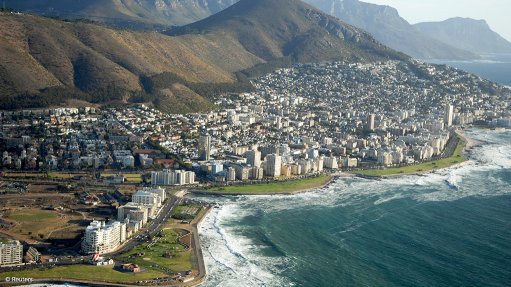
The City of Cape Town
The City of Cape Town has defended its decision not to accept bids for wheeled electricity as part of its first independent power producer (IPP) procurement round but says future tenders will cater for wheeling.
The city aims to enter into 20-year power purchase agreements (PPAs) with multiple tenderers but stipulates that every component power generation plant “must connect directly to the city’s network and no wheeled energy from generators connected to grids other than the city’s grid will be purchased”.
Energy and climate change executive director Kadri Nassiep tells Engineering News the decision to exclude wheeling was made primarily to ensure that the city could have full quality control over the initial IPP projects that would be introduced.
He acknowledged that this could increase bid prices, but highlighted that no bid above Eskom’s Megaflex tariff would be considered.
He also stressed that later tenders would cater for wheeling through the Eskom network and indicated that a second IPP procurement round could be launched within six months, depending on the city’s internal capacity to manage another tender.
The first IPP tender was published on February 18 and the city has set an official closing date of 10:00 on May 26.
Mayor Geordin Hill-Lewis will have an introductory briefing with interested parties later this month and an official tender clarification meeting is scheduled for 10:00 on March 11 for those IPPs interested in submitting a bid under the embedded generation procurement programme.
The tender document states that the combined total generation capacity for all technologies to be awarded will not exceed a total of 200 MW, which is below the 300 MW figure announced by Hill-Lewis.
However, Nassiep tells Engineering News that, subsequent to the drafting of the tender document, a decision had been made to increase the cap to 300 MW.
This would be confirmed both during the briefing that Hill-Lewis intended having with potential bidders, as well as during the tender clarification meeting.
All low-carbon generation technologies will be considered, including solar photovoltaic, wind and organic-waste to energy, as well as any low-carbon solution that is combined with storage.
The tender document outlines a 90/10 scoring framework, with 90 points allocated for cost and 10 points for preferential procurement.
The city will pursue a two-stage procurement process, whereby tenderers that meet the qualifying criteria will be invited to provide a financial offer in the second stage of the tender process.
“The City intends to award contracts to successful bidders on an incremental basis, starting with the highest scoring bid and continuing with progressively lower scoring bids, up until the full allocation has been reached.”
Winning bidders will be expected to design, construct and commission the plant within three years from date of signed PPA and the contract will be for a period of 20 years from date of commercial operation.